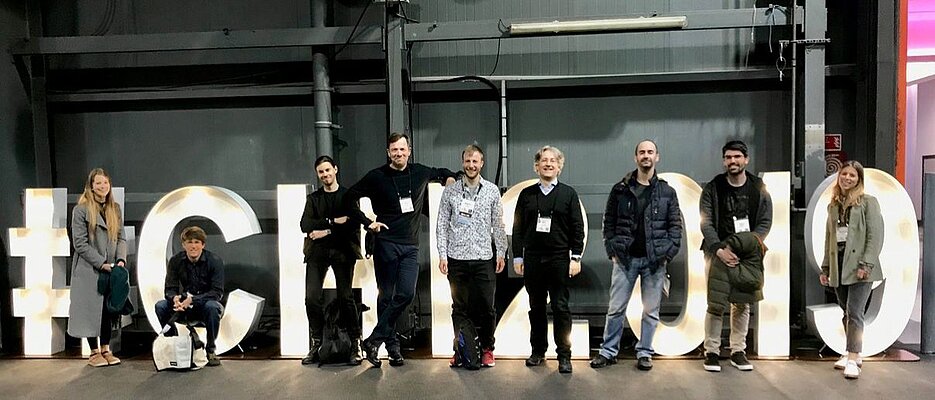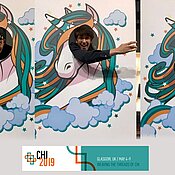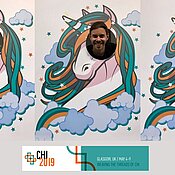PsyErgos und HCIler auf der CHI‘19
27.05.2019Der Lehrstühle für Psychologische Ergonomie und Human-Computer-Interaction waren dieses Jahr auf der CHI 2019 mit 5 Beiträgen vertreten. Die Konferenz fand in diesem Jahr in Glasgow, Schottland statt und gilt als die größte Konferenz im Bereich der Mensch-Computer-Interaktion. Die 3 Beiträge der PsyErgos beschäftigten sich mit dem Cognitive Aids im sicherheitskritischen Bereich der Akutmedizin, Persuasive User Interfaces, sowie UX Evaluationen in der Demenzforschung.
Tobias Grundgeiger stellte seine Arbeit zu Cognitive Aids in der Akutmedizin vor in der er untersuchte, wie Cognitive Aids Notfallteams unterstützen. Die Arbeit wurde mit einer Honorable Mention ausgezeichnet.
Abstact
Cognitive aids - artefacts that support a user in the completion of a task at the time - have raised great interest to support healthcare staff during medical emergencies. However, the mechanisms of how cognitive aids support or affect staff remain understudied. We describe the iterative development of a tablet-based cognitive aid application to support in-hospital resuscitation team leaders. We report a summative evaluation of two different versions of the application. Finally, we outline the limitations of current explanations of how cognitive aids work and suggest an approach based on embodied cognition. We discuss how cognitive aids alter the task of the team leader (distributed cognition), the importance of the present team situation (socially situated), and the result of the interaction between mind and environment (sensorimotor coupling). Understanding and considering the implications of introducing cognitive aids may help to increase acceptance and effectiveness of cognitive aids and eventually improve patient safety.
Daniel Reinhardt sprach in seinem Talk über den erfolgreichen Einsatz von heuristischen Informationen in persuasiven User Interfaces.
Abstract
Pursuing the goal of a healthy diet may be challenging, especially when self-control resources are low. Yet many persuasive user interfaces fostering healthy choices are designed for situations with ample self-control, e.g. showing nutritional information to support reflective decision making. In this paper we propose that under low self-control, persuasive user interfaces need to rely on simple heuristic decision making to be successful. We report an experiment that tested this assumption in a 2 (low vs. high self-control) x 2 (calorie vs. heuristic information) design. The results reveal a significant interaction effect. Participants with low self-control resources chose the healthy snack more often when snacks were labelled with heuristic information than when they were labelled with calorie information. Both strategies were about equally successful for participants with high self-control. Exploiting situations of low self-control with heuristic information is a new and promising approach to designing persuasive technology for healthy eating.
Stephan Huber stellte eine App zur Evaluation von User Experience für den Einsatz im Demenzbereich vor.
Abstract
Most user experience (UX) evaluation tools require users to self-reflect and to communicate their thoughts (e.g. thinking aloud, retrospective interviews, questionnaires). In the context of designing for people with dementia, however, conditions like aphasia and general cognitive decline restrict the applicability of these methods. In this paper, we report on the iterative design of Proxemo, a smartwatch app for the documentation of observed emotions in people with dementia. Evaluations of Proxemo in dementia care facilities showed that observers considered Proxemo easy to use and preferred it over note-taking on paper. The agreement between different coders was substantial (k = .71). We conclude that Proxemo is a promising tool for UX evaluations in the dementia context - and possibly beyond, but further research on the analysis of its generated data is required.
Alle Publikationen finden Sie hier:
Psychologische Ergonomie
Honorable Mention
Grundgeiger, T., Huber, S., Reinhardt, D., Steinisch, A., Happel, O., & Wurmb, T. (2019). Cognitive Aids in Acute Care: Investigating How Cognitive Aids Affect and Support In-hospital Emergency Teams. Proceedings of the 2019 CHI Conference on Human Factors in Computing Systems, 654:1–654:14. download
Reinhardt, D., & Hurtienne, J. (2019). Only One Item Left?: Heuristic Information Trumps Calorie Count When Supporting Healthy Snacking Under Low Self-Control. Proceedings of the 2019 CHI Conference on Human Factors in Computing Systems, 478:1–478:10. download
Huber, S., Bejan, A., Radzey, B., & Hurtienne, J. (2019). Proxemo or How to Evaluate User Experience for People with Dementia. Extended Abstracts of the 2019 CHI Conference on Human Factors in Computing Systems, LBW2712:1–LBW2712:6. download
HCI
Jean-Luc Lugrin, Marc Erich Latoschik, Yann Glémarec, Anne-Gween Bosser, Mathieu Chollet, Towards Narrative-Driven Atmosphere for Virtual Classroom, In Proceedings of the 38th ACM CHI conference (Late Breaking Work Track). 2019.Download
Sebastian Oberdörfer, David Heidrich, Marc Erich Latoschik, Usability of Gamified Knowledge Learning in VR and Desktop-3D, In Proceedings of CHI 2019, p. 175 ff.. 2019. Download
Weitere Bilder
Zurück





